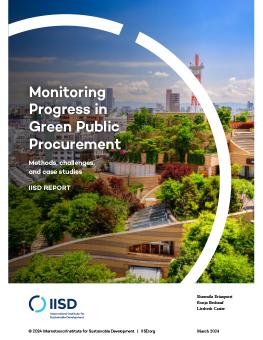
Monitoring Progress in Green Public Procurement
Methods, challenges, and case studies from Denmark, Japan, Malaysia, South Korea, Slovenia, and the Netherlands
This report outlines the importance of monitoring progress in green public procurement (GPP) and highlights various methodologies, challenges, and recommendations to improve monitoring practices. The report focuses specifically on monitoring how GPP reduces greenhouse gas emissions. Additionally, this report showcases GPP monitoring practices in South Korea, Japan, Slovenia, Denmark, Malaysia, and the Netherlands as real-life examples.
-
Governments are making great strides in monitoring not just green procurement activities but also tangible impacts, such as reduced waste, carbon emissions, and pollution.
-
South Korea saved 665,000 tonnes of carbon dioxide equivalent in 2017 through green public procurement while also creating 4,400 new jobs in the green economy.
-
The CO2 Performance Ladder helps to monitor suppliers’ carbon emissions and consider climate mitigation in public tenders.
Public procurement is responsible for approximately 15% of worldwide greenhouse gas (GHG) emissions, according to recent research from the World Economic Forum. “Greening” public procurement is therefore a critical strategy to support the reduction of GHG emissions related to government activities.
In recent years, the use of GPP increased significantly. Nearly all Organisation for Economic Co-operation and Development countries have formulated strategies or policies aimed at facilitating the integration of environmental goals into the public procurement process. To advance GPP, countries have reformed their legal and policy frameworks to enable or mandate GPP, improved the capacities of public procurers, and developed guidebooks, tools, and standard criteria for GPP. However, establishing GPP monitoring systems to track progress has often been an afterthought.
Effective GPP monitoring is key for countries to track progress toward their climate goals. For this report, we outline the importance of monitoring Green Public Procurement (GPP) and highlight the various methodologies, challenges and recommendations for improved monitoring practices. This report focuses specifically on improving the monitoring of the impact of GPP on GHG and carbon dioxide emission reductions.
An analysis of GPP practices in South Korea, Japan, Slovenia, Denmark, Malaysia, and the Netherlands reveals that successful GPP monitoring is driven by strong government support, effective collaboration, and access to necessary tools and resources. Despite these efforts, challenges such as insufficient data, knowledge constraints, and the complexity of GPP monitoring tools persist.
To address these challenges, we recommend that governments and procuring authorities
- define clear GPP objectives and targets,
- establish a legal and policy framework that mandates monitoring and establishes roles and responsibilities,
- foster effective collaboration among various governmental bodies,
- strengthen data management and control,
- invest in training and capacity building for procurement staff, and
- promote effective communication.
Implementing these recommendations will allow governments improve their efforts to monitor GPP and GPP impacts. This will, in turn provide, them with the necessary evidence to keep increasing GPP efforts and ensuring the use of public procurement as a driver of climate and sustainable development goals.
You might also be interested in
FAQ: Legal Considerations When Using the CO2 Performance Ladder in Public Procurement
This report answers frequently asked questions about the legal aspects of using the CO2 Performance Ladder as a green public procurement tool.
Advancing Green Public Procurement and Low-Carbon Procurement in Europe: Insights
Public procurement provides a key entry point for governments to change the trajectory of their greenhouse gas emissions and to meet climate goals in line with their international commitments to the Paris Agreement.
Public Sector Spending Could Make or Break Progress on the SDGs: Here’s how
Talk on how to close the USD 2.5–3 trillion funding gap needed to achieve the 17 UN Sustainable Development Goals (SDGs) typically focuses on mobilizing private capital. Yet public sector procurement practices could make or break current progress.
CSDDD: EU's Due diligence law vote should drive supply chain sustainability efforts
The European Parliament has voted to adopt the Corporate Sustainability Due Diligence Directive, aiming to address the environmental and social impacts of the supply chains of Europe's large corporations.